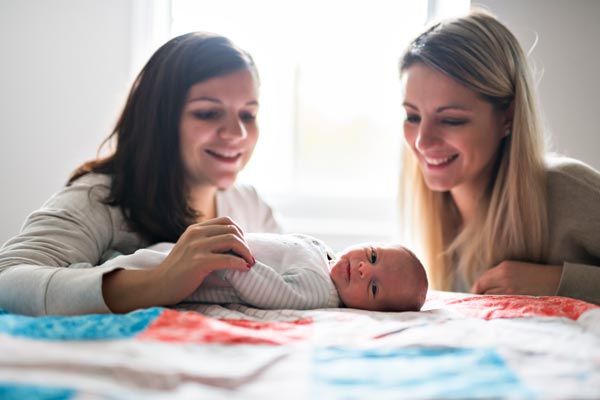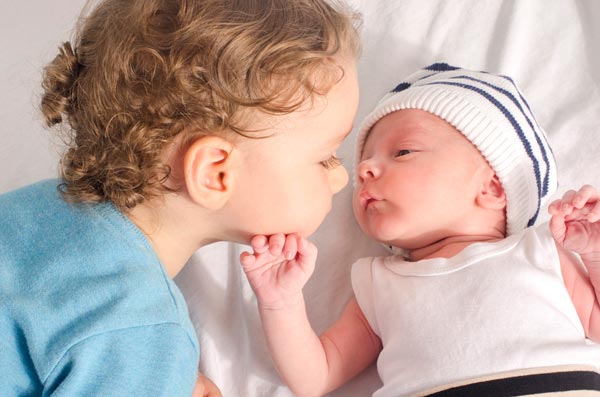8 Things Your Newborn Will Do That Might Surprise You

Preparing for a newborn usually focuses on ordering baby gear and setting up the nursery. Throw some childbirth education in there with a few baby showers and a dash of meditation and you have yourself the typical birth preparation for the average woman. However when you ask moms a few weeks after their birth what they would have done differently, you will hear them say they wish they had known a lot more about their baby.
More: The Psychological Reason 2/3 of People Cradle Babies On The Left
Learning about your newborn can be stressful because you’ll be working with limited communication skills like crying and...crying. Your baby will have different cries for various needs. They will require support for almost everything in the early days and you are responsible for figuring that out.
We’re breaking down a few typical things you should know about your newborn’s behavior so you are prepared and assured that your baby is healthy and thriving! You might be surprised at how much nature has pre-programmed for you.
Breast Crawl

When your baby is placed on your body after birth (immediate skin to skin) they are programmed to crawl from your belly to the breast. If you allow them the space and time (and if they are hungry, not all babies are!) to do this, you will see they instinctively make their way to the breast to nurse or find comfort. To learn more, see this video!
Hold Their Head Up (At Birth, Tummy Time)

Part of your baby’s ability to perform the breast crawl is their incredible strength to hold their head up and move it around. It will be choppy and uncontrolled, but they have the strength. You should also begin tummy time when your baby is two weeks old and you might be surprised how strong they are. Continue doing 20 minutes of tummy time everyday until your child can successfully sit-up (or until they will no longer stay in that position!).
Smile

This is always a bummer, but those precious smiles that occur during the first six to eight weeks of your baby’s life are really just gas or reflexes. Your baby’s body will be jerky as your baby’s muscles learn to navigate “the outside world.” Their face is no exception to this learning curve. While they aren’t intentional smiles, it makes for some incredibly cute photo opps. Your baby will develop “social smiles” around eight weeks old and they will be rooted in true emotion of love and admiration. Let your pediatrician know if you do not notice your child smiling by 8 weeks old.
Identify Their Parent Based on Smell

Your baby has extraordinary smelling skills from about six months gestation (in the womb). This is why a familiar-smelling shirt will soothe a crying baby. This also means that if their parent is nearby, they will certainly know it. Some babies will have such an acute sense of smell that they know when their mom walks into the building.
They Will Not Produce Tears

Despite how much babies cry, they do not produce tears immediately following birth. Your baby is born with underdeveloped tear ducts and will begin to produce tears somewhere in the first three months of life. If you notice that your baby has tears in their eyes even when they are not upset, they might have a clogged tear duct and you should contact your pediatrician.
Recognize Their Mother’s Face

Babies are born with not-so-great eyesight. When they are born, they can smell incredibly well, are sensitive to noises and are experiencing touch for the first time ever. Mother nature allows this to set in and intentionally delays their eye development for the first six to eight weeks. At birth, your tiny human will be able to see only about eight to twelve inches in front of them. They are also limited in color to red, white, and black. Other colors will develop around the sixth week of your baby’s life and you may notice temporary increased fussiness due to the overwhelm of their incoming eyesight.
Senses When People are Around Them

Since your baby is experiencing everything for the first time, they are extremely sensitive to energy. They can sense when other humans are around. This means they are also very sensitive to anger, anxiety, worry, and tension. Your baby will pick up on everything, so be mindful that the atmosphere is calm and nurturing. You want to lay a supportive and gentle foundation for your child’s sensory system.
Requires 15-18 Hours of Sleep a Day

Many people don’t realize that your baby is designed to sleep most of the day for the first few weeks. Again, mother nature intentionally designed this to be a time to allow your body to heal. Your baby will sleep in one to two hour increments around the clock. This sleep allows your baby’s sensory system to adjust to being outside of the womb and allows their brain to “hardwire” all of the input and “data” they collected in the time they were awake. Since your baby is a newborn, they should be tired after 30-60 minutes of awake time and will need to sleep again. Many babies will only wake to eat and have a diaper change before needing more rest. This sleep pattern may soon come to an end so take advantage while you can.
Babies are so cool and they are born very intelligent. If adults give tiny humans the space to learn and try, you will constantly be surprised at how incredibly smart they are. Your baby will change day-by-day and if you take the time to pause and just observe, you will be mind-blown at how much they are capable of on their own.
Get a glimpse at life with a newborn from one FamilyEducation staff member’s look at What's It REALLY Like Having a Newborn Baby at Home?

